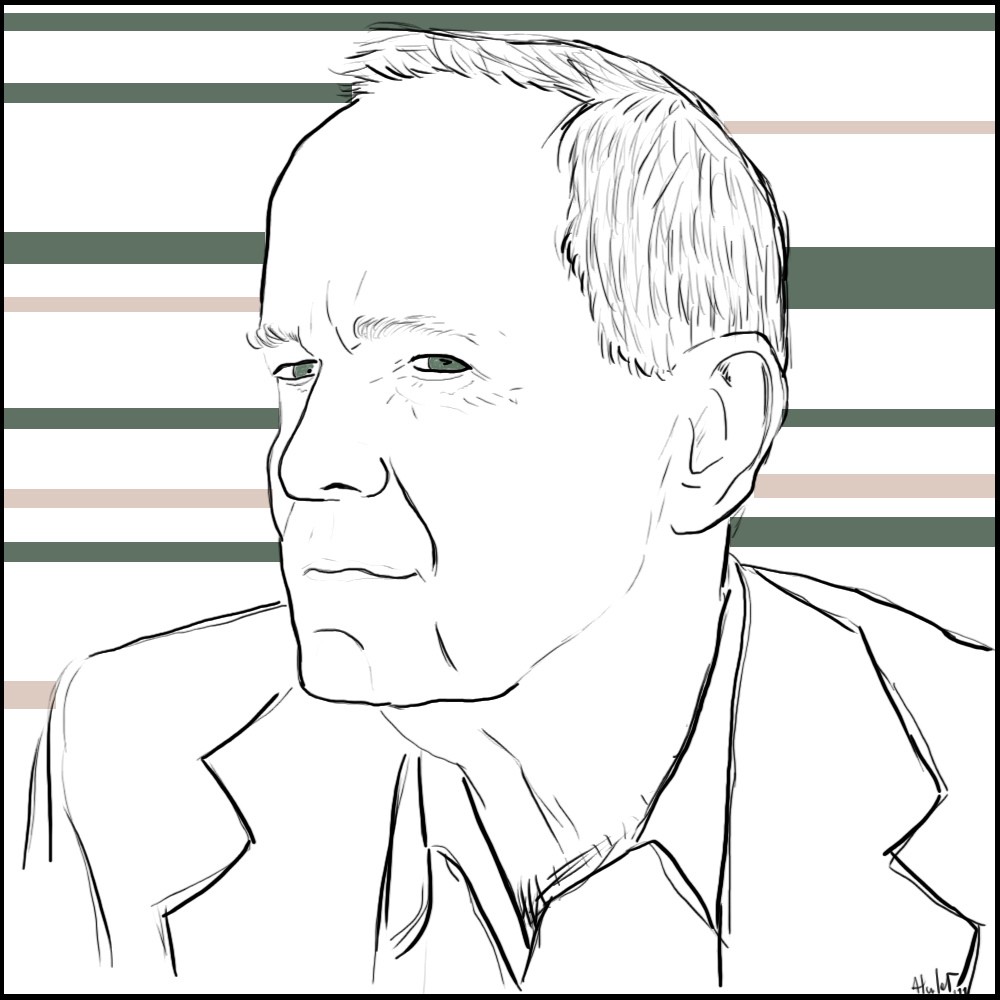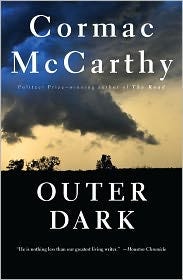Books & Culture
Cormac McCarthy Smiles

by Matt Bell


One of the rules I’ve heard taught most often in writing workshops is that you shouldn’t use “smile” or “shrug” too frequently — if at all — as they can serve as a sort of crutch keeping you from writing stronger and more-telling action around your dialogue. I’ve said it myself, and one of the things I often look for in revision are opportunities to replace those smiles and shrugs that do creep in with something better. (Of course, one thing about writing is that as soon as you stamp out one weak move, you almost immediately find a replacement addiction, which might account for all the cigarette smoking that happens during dialogue in seemingly everyone’s early stories, including mine.) Still, while there is definitely some truth to this, every rule has its exceptions, and there are surely plenty of smiles and shrugs in even the best books.
For example, I recently reread Cormac McCarthy’s Outer Dark, which is notably full of horrific violence: people are murdered with brush-hooks and bodies are left hanging from trees, there’s grave-robbing and vultures eating the flesh of the dead and hordes of pigs being run off the edge of cliffs alongside their drover, among much else (and that’s not even mentioning the act of incest and attempted infanticide that kicks off the main action of the book). But despite the incredible violence and the gravity of its plot, there is also an awful lot of smiling happening — and McCarthy’s smiles are often accompanied by adverbs, a violation of another “rule” I hear constantly from other writers that, while again containing a portion of helpful advice, is really just the expression of a particular once-dominant aesthetic.
McCarthy is one of my favorite writers, and his prose is impeccable throughout Outer Dark, mixing what the New York Times called “a style compounded of Appalachian phrases as plain and as functional as an ax” with “a second diction taken from that rich store of English which is there in the dictionary to be used by those who can.” Nothing about his prose or the novel as a whole is diminished by the many times his character smile — sometimes “slightly,” sometimes “weakly,” sometimes “dreamily,” sometimes with smiles “whitelipped” or “malignant” or “wincing” — and it’s a good reminder that very few rules hold up everywhere, and that great writers are constantly breaking or disregarding the guidelines that get parroted so often in our writing classes.
In 242 pages, McCarthy uses the word “smile” thirty-three times, more than once every ten pages. More than half of the thirty-three occurrences are verbs used for people actually smiling:
Holme smiled.
Holme smiled slightly.
Holme smiled weakly.
The man smiled again.
She saw the man smile.
The woman smiled and she smiled back.
His assassin smiled upon him with bright teeth, the faces of the other two peering from either shoulder in consubstantial monstrosity, a grim triune that watched wordless, affable.
The beehiver smiled his little smile and slung the coat upon his shoulder again and they went on.
The tinker smiled and captured the beanbowl between his thin shanks and wiped up the remnants with the last of the bread.
Then it started, an explosion of curses and oaths in such ingenious combinations that the other smiled appreciatively.
John smiled cynically, the gun cradled in the crook of his arm.
The lawyer nodded and smiled.
Harmon looked up and smiled.
The squire smiled.
The bearded one smiled.
The blind man smiled.
He smiled dreamily.
The storekeeper started to smile and then he stopped smiling.
“Smile” is also used frequently as a noun:
You like two pennies, the clerk said with a small malignant smile.
There was a trace of a smile at his mouthcorners.
The other stood with long arms dangling at his sides, slightly stooped, his jaw hanging and mouth agape in a slavering smile.
He spared a wincing smile to this traveler.
She tucked the package beneath her arm and set forth, shortgaited and stiffly, humming softly to herself and so into the sunshine that washed fitfully with the spring wind over the glade, turning her face up to the sky and bestowing upon it a smile all bland and burdenless as a child’s.
At the corner a man sprang up, a face pale and contorted in a whitelipped smile, and brought the slat flatwise across his back with a sound that exploded clear through him.
They altered their course and came upon a log road down which the wagon receded in two thin tracks and upon a burst lizard who dragged his small blue bowels through the dirt, breaking into a trot, a run, the first of them reaching the horse and seizing the reins and turning up to the driver a mindless smile, clutching the horse’s withers and clinging there like some small and vicious anthroparian and the driver rising in remonstration from the wagon box so that when the next one came up behind him sideways in a sort of dance and swung the brush-hook it missed his neck and took him in the small of the back severing his spine and when he fell he fell unhinged sideways and without a cry.
Here McCarthy uses “smile” as both a noun and a verb in the same sentence:
He waited very still by the side of the road, but the blind man passing turned his head and smiled upon him his blind smile.
There’s also a few uses of “smile” indicating its absence:
Clark never had smiled.
He stood rigid and upright in the coffin-sized doorway with no expression, no hint of a smile, no list to his bearing.
Once it’s used to indicate an expression that is not quite smiling:
The man’s teeth appeared and went away again as if he had smiled.
And finally, there’s one use of a “smile” as a metaphor — and as terrible as it is in context, it’s maybe even worse coming last after this list of less gruesome uses:
Holme saw the blade wink in the light like a long cat’s eye slant and malevolent and a dark smile erupted on the child’s throat and went all broken down the front of it.
What about McCarthy’s other books? There are six smiles in The Road, plus one almost-smile. “Smile” appears sixty-three times in Blood Meridian, including twenty-four occurrences of the phrase “The judged smiled,” and it appears 118 times in Suttree. The word appears thirty-four times in No Country for Old Men, only five times in Child of God, and — strangely — exactly fifty-six times in each book of The Border Trilogy, for a total of 168 occurrences across the three books.
But so what? The higher-than-average amount of smiling in McCarthy’s books doesn’t necessarily affect the quality of the work, only its character. Another perennial English teacher admonishment is how the exclamation point should be used incredibly sparingly and that each writer only gets a certain number of exclamation points for his or her career. Whatever his starting allowance, it’s a good bet McCarthy has never used one in a novel, since he’s been quoted as saying exclamation marks and semicolons “have no place in literature.” (An editor of his once remembered seeing him use a single colon, somewhere.) But the absence of exclamation points isn’t by itself what makes McCarthy a great writer, and you’re unlikely to see that particular statistic cited in reviews of his work, although his unorthodox punctuation is often mentioned.
Adherence to the “rules” is perhaps best when it’s a private thing, and teaching others the ones we’ve been taught or the ones we’ve discovered should perhaps be more sharing what’s worked for us or in books we’ve loved than it is handing down directives. We all have our rules we try to live by upon the page, which despite how frequently we repeat them to others are perhaps most useful only to ourselves, as a reminder of the constraints we’ve chosen to place upon our art, the ways we hope to arrive at a better prose than we might otherwise produce. The trick is not to let those constraints become straightjackets, leaving us incapable of fully expressing the stories we’ve set out to tell, and so it’s often worth studying the ways in which a great writer has violated these commonly-expressed tenets of “good writing” in order to get somewhere even greater. As my friend Drew Johnson said to me recently, in a conversation about Faulkner’s preferring to tell rather than show in some of the best parts of The Sound and the Fury: “My favorite thing about this discipline is that there’s no rule that isn’t a dare.”









